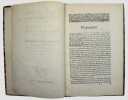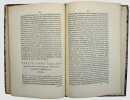CURAEUS, Joachim
Exegesis perspicua et ferme integra controversiae de sacra Coena, scripta ut privatim conscientias piorum erudiat, et subiicitur judicio sociorum confessionnis Augustanae, quicunque candide & sine privatis affectibus judicaturi sunt.
(Genève, Eustache Vignon), 1574.
Reference : 17857
Edition posthume donnée par Théodore de Bèze. (Cfr Bèze, Correspondance, t. XV, p. 94, note 7.) Il existe deux tirages : l'un, comme celui-ci sans colophon, l'autre, (exemplaires de la Bibliothèque de Genève et de la Bayerische Staatsbibliothek.) avec la mention au bas du dernier feuillet : "Genevae, excudebat Eustathius Vignon, anno 1574". Joachim Cureus (1532 - 1573) était l'un des étudiants de Philipp Melanchthon. Il devint syndic de la ville de Glogau et y joua un rôle décisif dans l'introduction de la Réforme en 1564. C'est ici son écrit le plus important. L' "Exegesis perspicua" porte sur la doctrine de la Cène, qui a conduit à la persécution des Philippistes, par les gnésio-luthériens et les crypto-calvinistes sous l'électeur August de Saxe. Marque sur le titre de Eustache Vignon à l'ancre et au serpent. Coiffe supérieure abimée. USTC 450669. GLN-2505. /// In-4 de 96 pp., [A-M4] Demi-chagrin vert, titre doré. (Reliure du XIXe.) //// Posthumous edition given by Theodore de Bèze. (Cfr Bèze, Correspondance, t. XV, p. 94, note 7.) There are two editions: one, like this one without colophon, the other (copies of the Bibliothèque de Genève and of the Bayerische Staatsbibliothek.) with the mention at the bottom of the last page: "Genevae, excudebat Eustathius Vignon, anno 1574". Joachim Cureus (1532 - 1573) was a student of Philipp Melanchthon. He became a syndic of the city of Glogau and played a decisive role in the introduction their of the Reformation in 1564. This is his most important writing. The "Exegesis perspicua" deals with the doctrine of the Lord's Supper, which led to the persecution of the Philippians and the Crypto-Calvinists by the Gnesio-Lutherans under Elector August of Saxony. Mark on title of Eustache Vignon. USTC 450669. GLN-2505.
Bookseller's contact details
Hugues de Latude
Hugues de Latude
06 09 57 17 07
Payment mode



Sale conditions
Books are guaranteed to be complete and in good condition unless otherwise stated.
 Write to the booksellers
Write to the booksellers




